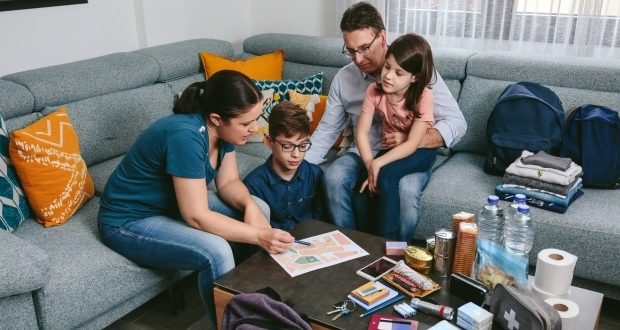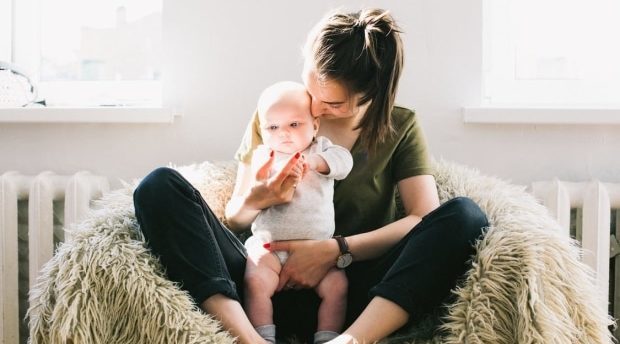Preparing Your Family For The Unexpected
We always want to keep our family safe. For that reason, it can be difficult to think about what could go wrong. While fear is valid, emergency preparedness is an essential part of raising a family. There are many things to consider when preparing your family for the unexpected.
The more prepared you are for disaster, the safer your family will be. Do you live in an area that is prone to natural disasters? Has there been a history of criminal activity near your neighborhood? Do you have everything you need in case of an evacuation?
These are all questions you need to answer with your family. Emergency preparedness means having difficult conversations with your children to keep them safe. It is a normal and important step to being a leader your family can rely on.
Why Should My Family Prepare for Emergencies?
Even if nothing ever happens, it is always important to let your family know what to do in the case of an emergency. This can be helpful for many reasons. For one thing, you and your partner can help your family without providing a lot of instructions.
This can also be helpful if you happen to live in an area prone to many potential safety hazards. For example, if you know that tornadoes are prevalent in your area, you can build a basement for your home. You can also plan ahead and make survival kits if you need to wait for rescue in the basement.
Of course, we hope you never have to experience anything like this. But, it is for that reason you should focus on taking every precaution available if it ever does occur. If you would like to start discussing emergency preparedness with your family, here is everything you need to know.
Types of Emergencies
Natural disasters are not the only problems that could affect your family. Emergencies are anything that could harm you or your household. With that in mind, it is always important to discuss emergencies with your children and what they can do in every situation.
Danger to Health
Danger to life has similar consequences, but the difference has to do with the severity of the emergency. Threat to health includes non-life-threatening emergencies that still need urgent medical care. This can consist of monitored illnesses that haven’t improved (i.e., a cold turned into a sinus infection).
For example, say your children are spending an afternoon with their friends. One of them is having some fun but accidentally lands on their leg wrong. Upon realizing that it’s broken, their sibling calls an emergency contact immediately and escorts them to urgent care.
Danger to Property
Danger to property includes anything that could harm people within the building. This commonly occurs with fires, but this can also apply to home invasions or burglaries. Even so, if you or someone else notices something is wrong, your gut feelings are likely correct.
If this were to happen in real life, this could occur as a strange smell in the house. The dog is agitated about something and wakes you up in the middle of the night. Upon realizing that smoke is entering the room, you and your family take the necessary steps to escape your home.
Danger to Life
As the name entails, danger to life includes difficult situations that immediately threaten a person’s survival. Common examples of this include heart attacks, strokes, and traumatic brain injuries. These emergencies should never be ignored and need immediate medical attention.
Take a scenario where your partner collapses while you are at work. Since you taught your children basic first aid, they realize their caretaker is not breathing. They know how to call 911 and follow the dispatcher’s instructions until an ambulance arrives. Thanks to your teachings, your partner survives a heart attack.
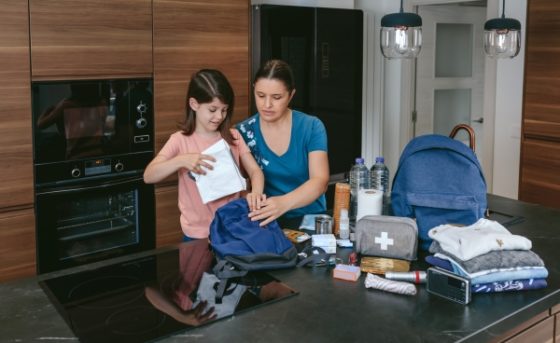
Disaster Preparedness
Being prepared for every type of disaster means that your family is much more likely to survive a dangerous situation. Be empathetic to fearful feelings, but assure your children that you will do everything in your power to keep them safe. They could save a life with the information you give them.
Educate
Educate everyone about safety and what they can do to protect themselves and/or others. This can be addressed in different ways, especially if you have younger children. But, the older your children are, the more they can learn to increase their survival skills.
Teach them about different types of emergencies, what to do for every situation, and how they can help if it involves another person. For example, go through a survival kit and add visualization to the name of objects that may be important during an emergency.
Create a Contact List
Collaborate with your partner to create an emergency contact list. This should include numbers to the police, the nearest hospital, and other trusted family members. Ask your closest neighbors for permission to include their numbers, especially in the case of a home invasion or fire.
It may seem silly to include an emergency contact list, but it could also mean the difference between life and death. This can be especially important if you have younger children who won’t be used to calling people by phone. This can even be helpful for teenagers who will know how to call 911 but may not realize the local hospital has a different number.
Establish a Meeting Place
If there ever comes a time that you get separated from each other, having a designated meeting place will prevent anything worse from happening. This can include a cul de sac at the end of your street, a grassy area near your house, or a safe public building like a police station.
For example, after your family escapes your home from a fire, you all meet at the end of your street. You all arrived at different times, but what matters is that you made it together. This can also apply if an emergency occurs locally, like in assault cases where it is unsafe to be around a crime scene.
Natural Disasters
Nature can be beautiful, but it can also be unpredictable. When disaster strikes, it’s important to know what to expect. Generally speaking, you always want to have a survival kit ready to go and a safe place to take shelter. Teach your children how to stay calm during uncontrollable disasters, especially if they could be life-threatening.
Plan Ahead
Are you close to the sea or live in an area that is prone to tornadoes? Work with your partner to track the area and decide what to prepare for. No matter what, start working now in case it were to ever happen to your family. This can prevent panic or safety concerns for you and your children.
Create a list of things to do before a natural disaster occurs. For example, if you know that your landscape is prone to flooding, install a sump pump. Consider adding a basement if you don’t have shelter in an area with lots of tornado sightings. Adding these preventative measures now will prevent greater problems in the future.

Store Food and Water Ahead of Time
Food and water are essential for survival. Generally speaking, you need one gallon of water per person for each day. With that in mind, having a storage space for extra food will be necessary for areas prone to disaster.
In the case of power outages, pre-packaged food is perfect for nourishment. Have a large amount of food available that can last for long periods. You won’t have access to perishable food during a natural disaster, so have food that won’t need a stove or microwave.
Pack a to-go Bag
Sometimes, the only thing you can do is run. In the case of wildfires, there may be very little time to grab everything you need. You may need to evacuate your home on very short notice. With that in mind, having a to-go bag could help everyone in your household.
A basic to-go bag should include all the essentials: a change of clothes, a first aid kit, and a light source. This should also be something that stays out of your family’s rooms. Keep to-go bags in your car in case of an emergency. You should also check them for changes in season.
Maintain Your Home
As mentioned above, you should take inventory of your home and decide what needs to change. Working on your home before disaster strikes could prevent other problems that could harm your family.
This can also mean simply taking care of your home. For example, if you have a fireplace installed in your home, conduct regular inspections. Many fires occur because of gas, soot, or dust buildup. With that in mind, preventing disaster could be as simple as keeping your house clean.
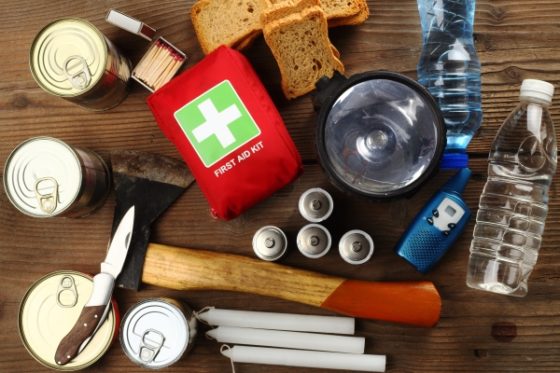
Survival Supplies
Some situations will need survival supplies to keep your family safe. For example, many people who live on the coasts need to plan for hurricanes. If this applies to you, it may be time to consider stocking up on supplies. When you can only wait out a storm, it’s important to prepare for anything.
Extra Water and Food
Have clean water available for everyone in your household. One gallon of water is needed for each person, so try to determine how much you should buy for an average disaster. If you don’t live in an area with a risk for long-term survival, keep a few extra gallons in storage.
Keep snacks in to-go bags and store non-perishable food with your water. This can be helpful for anything, particularly power outages. The power can go out for anything and during any season. For that reason, having extra food can be essential when you don’t have access to basic kitchen amenities.
Protective Weapons
Although we hope you never have to use any of them, protective weapons may be necessary for emergencies. For example, having a gun safely stored in your bedroom could keep out home invaders if you have a permit to carry it.
A form of protection should always be included with survival supplies. Alternatives to guns include knives, hatchets, and bats. These can also help in the case of fallen debris, first aid, or emergency shelter.
Light Source
Having a light source is an essential survival tool. If the power goes out, you’ll need to be able to see. It can be surprising how inconvenient it is to be without a light source, even for the simplest tasks.
Give everyone in your family one light source, preferably flashlights. But, if need be, matches can temporarily help. Add extra batteries to your survival kit, including a flashlight, and teach your children how to use all the light sources.
Radio
Even when there isn’t electricity, radios will always be available to help. Having a radio will keep your family informed, especially if you’re in a dangerous area. While you’re trapped in your home, you can listen to the radio to find out where the nearest rescue team is.
You can learn about still dangerous areas, safe spaces to take shelter, and weather conditions with a radio. They are inexpensive and an incredible asset to your family’s survival. If you get caught in a severe storm, have a radio available to hear the latest news.
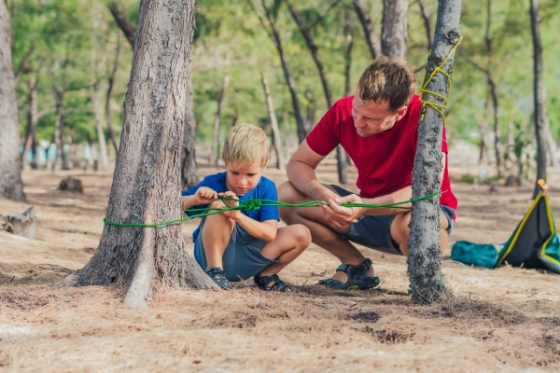
Always Be Prepared
Don’t get caught off guard by emergencies. Teach your children basic survival skills, first aid, and how to call 911. Be role models by practicing the same amount of courage that you expect out of them. Above all, remember to stay calm, take action, and be prepared.

